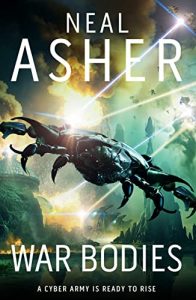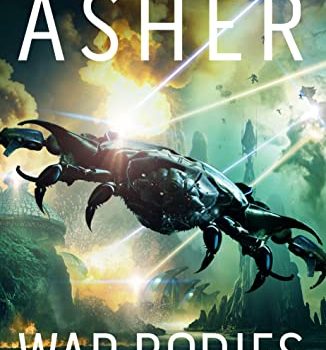Russell Letson Reviews War Bodies by Neal Asher
 War Bodies, Neal Asher (Tor UK 978-1-5290-5008-0, £20.00, 563pp, hc) July 2023. Cover by Steve Stone.
War Bodies, Neal Asher (Tor UK 978-1-5290-5008-0, £20.00, 563pp, hc) July 2023. Cover by Steve Stone.
I have been trying to get a line on Neal Asher since first encountering his Polity universe two decades ago. My first thought was, here is a writer taking on many of the features, themes, and tropes that give, say, Iain M. Banks’s Culture books their New Space Opera appeal: a star-spanning, postscarcity civilization run by artificial intelligences on behalf of a citizenry mostly free of the physical and intellectual limitations of unenhanced biology. Thus, peace, plenty, and a safe and rational environment in which to pursue life’s bounty, supported by near-magical technologies. Oh, and to have adventures, in those neighborhoods where conditions are less optimal.
But, a few books in, I noticed in Asher a political-philosophical flavor distinctly different from Banks’s – especially in the light of the sometimes acerbic chapter epigraphs from the imaginary reference works Quince Guide (“compiled by humans”) and How It Is. In both the Polity and the Culture novels, the galaxy at large remains a dangerous environment, and beyond the borders of civilization (or even within them) there are pathological societies, criminal elements, dire environments (natural or devised), and predatory beings that need to be Dealt With. Asher’s take on this state of nature is quite a bit darker and bleaker than Banks’s (which is saying something) and includes even larger doses of depravity, predation, and transformation-unto-utter-Otherness: gods and monsters, but mostly monsters. So in the Polity, addressing that side of things requires a quite troubling degree of ruthlessness and moral flexibility on the part of the guiding AIs, particularly when the problem is, say, a war of survival against the xenophobic, expansionist, and appallingly competent giant-crablike Prador.
The newest Polity novel, War Bodies, takes on some of the tensions between ideals and necessities pretty directly. The book is set late in the Prador War, and at its center is a campaign to evict the occupying Prador from a human-settled world. Its other focus is on the maturing of the young man who conducts and wins that campaign, so War Bodies merges military SF and the Bildungsroman, with the additional twist that Piper, the young man in question, is also on his way to becoming superhuman, even by the standards of the Polity.
Asher has dealt with such matters before, in the origin stories of superpowered protagonists Earth Central Security agent Ian Cormac (Shadow of the Scorpion ) and Alan Saul (The Departure). More interesting than the piling on of superpowers in Asher’s work, though, are the examinations of internal transformations, notably in the aptly titled Transformation trilogy, in which a godlike (but very disturbed) rogue AI grants unwary bad actors’ wishes in ways that are not quite what they anticipated.
At the beginning of War Bodies, Piper does not know that his father has made experimental enhancements to his body and nervous system – literally installing them in his bones – that go far beyond what is usual even in the Cyberat culture of the long-isolated Founder’s World. These pre-Polity, anti-AI ideologues see the organic side of humanity as something to be minimized in favor of a cyborgian fusion of human and machine:
people with cyber limbs, extra limbs, or metal torsos, but also with smaller additions ready to take something larger…. and their bodies would continue to be steadily stripped away until only a core of humanity – a plug form – remained, wrapped in interfaces.
Cyberats have not always agreed about the ideal kind and degree of “progression,” which has led to schisms, revolutions, and regime changes, and Piper discovers that the policies of the currently dominant group – the Old Guard – is more about maintaining their own power than any strong belief in Cyberat doctrine. Nor is the Old Guard happy that their world has been rediscovered by Polity AIs, and they are right to be unhappy, since the Polity intends to undermine their regime as part of a larger project, which is to send an army of militarized Cyberats to invade and subdue the Prador-infested world of Yannetholm, with a fully empowered Piper at its head.
The novel is doubly procedural, tracking Piper’s exploration and expansion of his powers in the course of a series of military actions, first against the Old Guard and then, in the novel’s second half, the Prador. The military part, however detailed and gaudily explosive, forms the armature for what I take to be the book’s actual interest: Piper’s progress toward superhuman status and his development as a leader as his gifts grow to include not only tactical and strategic genius but complete control of the behavior and loyalty of his forces. Like the AIs and Polity agents who observe and guide this evolution, Piper needs to work out the moral equations, juggling costs and benefits when the costs are the autonomy and lives of those he leads and the benefits can be very long-term and provisional.
In addition to his efforts to construct an ethical leadership code, he struggles against the id-like shadow personality he thinks of as “the reptile” – irrational, angry, impulsive, and to be repressed. It is, however, not just a bad-tempered side of his self, but an apparently autonomous aspect of his enhancements, and a complicating factor in the process of mastering and integrating them.
The question of the true self runs through the novel, starting with the “war bodies” of the title: literal military devices, the robotic bodies into which “plug-form” Cyberats install themselves, to the point where the cyborgian entity is the self. Piper has a war body, too – more of a small warcraft – though he pilots it in his standard-form but extensively rewired human body. In this mode, Piper is a layered being: the computational-communication machinery (including the reptile) in his bones; his Polity-improved organic body and mind; the war body that is vehicle, armor, weapons systems, and tactical base; and the gradually integrating suite of mental abilities and understandings and social-moral calculations that are determining what kind of person he will become.
This might be Asher’s most ambitious book, though not perhaps the kind of high-energy action entertainment that some of his readers might expect. The action sequences are as vivid, and the treatment of superpowers is as extravagant as ever, but at every stage, attention is given to Piper’s introspections and to conversations and exchanges with his mentors and subordinates about the morality of total warfare and the ethics of military leadership – about costs and benefits and the moral uses of power. Piper’s internal campaigns are at least as important as the one against the Prador, and the resolution that emerges in the novel’s last three paragraphs marks what the real battles were about.
Russell Letson, Contributing Editor, is a not-quite-retired freelance writer living in St. Cloud MN. He has been loitering around the SF world since childhood and been writing about it since his long-ago grad school days. In between, he published a good bit of business-technology and music journalism. He is still working on a book about Hawaiian slack key guitar.
This review and more like it in the October 2023 issue of Locus.
 While you are here, please take a moment to support Locus with a one-time or recurring donation. We rely on reader donations to keep the magazine and site going, and would like to keep the site paywall free, but WE NEED YOUR FINANCIAL SUPPORT to continue quality coverage of the science fiction and fantasy field.
While you are here, please take a moment to support Locus with a one-time or recurring donation. We rely on reader donations to keep the magazine and site going, and would like to keep the site paywall free, but WE NEED YOUR FINANCIAL SUPPORT to continue quality coverage of the science fiction and fantasy field.
©Locus Magazine. Copyrighted material may not be republished without permission of LSFF.








